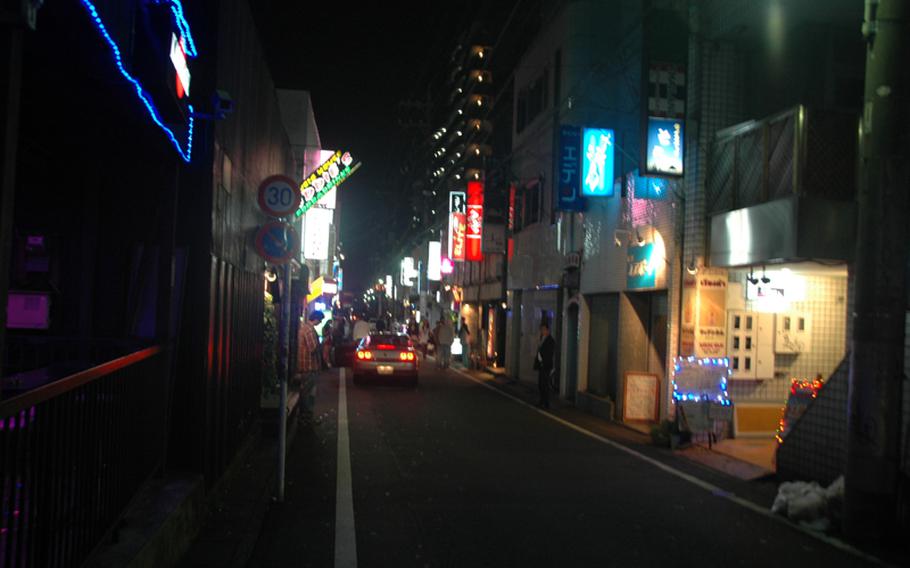
The lights were on at Fussa's Bar Row on the night of Oct. 26, 2012, but there were a lot less people than normal on the street after 11 p.m. (Seth Robson/Stars and Stripes)
YOKOTA AIR BASE, Japan — Colorful neon signs still blaze at bars outside Kadena Air Base, but the front doors are shut and there are no Americans in sight in the normally bustling Okinawa entertainment district.
It’s a scene that’s become common at off-base watering holes frequented by servicemembers across Japan since a curfew was imposed Oct. 19 on all American military personnel following the alleged assault and rape of an Okinawan woman by two U.S. sailors. It restricts most off-base travel from 11 p.m.-5 a.m., with violations punishable under the Uniform Code of Military Justice.
That doesn’t necessarily mean that troops stuck inside the gates are heading home for warm milk and an early bedtime. Business is booming at on-base clubs, which are hiring more bar staff and extending hours to cope with a massive influx of patrons seeking late-night entertainment.
But troops complain they’re being treated like kids. In fact, their dependents and other civilians now have more freedom, since they’re not affected by the curfew, although military officials have asked them to honor it. And the on-base clubs have fewer unattached women than off-base bars with their hostesses.
There are perhaps three dozen establishments in the bar row outside Yokota Air Base, each capable of accommodating up to 100 or more guests, and the scenario is similar at other U.S. installations in Japan, so there’s a lot of money — and jobs — at stake.
Judging by the thin crowds along bar row on Friday and Saturday nights, the curfew clearly is having an impact.
Ryojin Kuwae, a former chair of the Nakanomachi Business Owners’ Association, said many bar owners near Kadena are suffering. They say their clientele dwindles as the curfew nears, which is about the time when business usually picks up.
“Whenever servicemembers commit a wrongdoing, it’s us Okinawans who are … punished,” he said.
Tsutomu Arakaki, owner of Amazonesu, one of the oldest bars near Kadena, has been through this before. A curfew 14 years ago forced him to shut down for a year. Now he’s planning to collect signatures on a petition seeking compensation from the Japanese government for curfew-related losses on Okinawa, where the majority of U.S. forces in Japan are based.
Sasebo’s bar district, known as “Sailor Town,” is a ghost town after 11 p.m. on a typical weeknight, with only a few Japanese customers drinking alongside American civilians and contractors.
“It’s affecting everybody,” said Taro Kurosaki, a bartender at Sasebo’s G-Rock club. “I walk outside and there’s nobody there.”
Kurosaki said he supports the curfew but that it’s forced his bar to close early and will result in staff losing shifts next month.
“We’re hurting on the weekend,” he said. “It’s kind of obvious already.”
Before 11 p.m., U.S. airmen still drink alongside Japanese and Filipina patrons at pubs on Fussa’s bar row. But while those sitting there last week were unanimous in condemning the two sailors who are in custody on Okinawa, none supported the curfew.
Rape is a horrible thing, “but stuff like this does happen,” said Kamikaze bar patron Senior Airman Andrew Van Langendonk, 23, of Gainesville, Fla., who has been hanging out on bar row several times a week since he came to Japan two years ago.
“From a young airman’s perspective, we are being made to pay for something another branch did in another part of Japan. … I don’t see why we should be punished,” he said.
Van Langendonk, who is moving to Kunsan Air Base in South Korea this month, said he went to Yokota’s overcrowded Enlisted Club on base last Saturday because he didn’t want to violate the curfew.
“It was miserable,” he said. “It was so hot, and it took me 40 minutes to get a drink. It was my last weekend in Japan, and I couldn’t go out and enjoy myself.”
The Enlisted Club is packed with twice as many customers as usual on the weekend, according to manager Johnathan Boyd.
“Both nights (Friday and Saturday) we saw a significant increase in business,” he said. “Of course that’s due to the curfew.”
The club is looking to hire more bartenders and open its ballroom on the weekends to handle the crowds, Boyd said, adding that he’s also hoping to fly in some live entertainment from the U.S.
Money spent at the club helps fund quality-of-life programs on the base, he said, so the current boom means an extra influx.
Another airman at bar row last week, Sgt. James Balajadia, 25, of Guam, said he thought leaders were trying to protect servicemembers from a possible Japanese backlash over the alleged rape. But the curfew goes too far, he said.
“Nobody likes to be treated like a kid when you are a man,” he said. “They are trying to keep us safe … [but] I’ve never had a Japanese person be mean to me because I’m American.”
Kamikaze’s owner Marco Fukumoto, who’s been running bars in Fussa for 15 years, said business has dropped 80 percent since the curfew began and that he expects to lose thousands of dollars each week until it is rescinded.
“Just two people did it (the alleged rape) so why is it everybody’s fault?” he asked.
One place near Kadena that appears to be less affected is Club Queen, which catered to servicemembers a few years ago but, nowadays, tries to draw in mostly Japanese clientele, according to manager Masahide Nakasone.
“We are not affected by the curfew at all,” he said. “It’s about time for us to stop clinging to the business that is forever vulnerable to the situation and whims of the military.”
Stars and Stripes reporter Matt Burke contributed to this report.